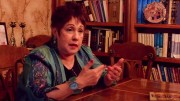Nicholai Sennels has been featured on this site before. I first came across him writing on the subject of Islamic incest, and the problems that we in the West are left with when it comes to looking after the tragic and genetically damaged offspring of Islamic cousin marriages.
Here he is again speaking to the New English Review (with an excellent forward by Dr Nancy Kobrin) about the problems of Islamic criminals and the terrible problems Western countries have in effectively socialising and integrating Muslims.
It appears that Islamic crime, not only terror but also sex crimes, property crime and generalised violence etc, are not down to issues of poverty, lack of employment opportunity or racism, as much of the Leftist establishment would like us to think it is. Islamic crime does appear to have a cultural element which means that not only are those brought up in Islam more likely to be rapists etc but that the strong current of false victim-hood that Islam promotes, makes it an attractive ideology for non-Muslim criminals, hence the growing number of prison converts to Islam.
Mr Sennels says that there is a huge difference in how the different cultures deal with issues of guilt, personal responsibility, anger and self control. To give an example from the piece, the showing of anger or rage is, in the Judaeo-Christian world a negative thing, a sign of loss of internal control, but in the Islamic world rage and anger are considered as socially acceptable. Worse not being full of rage, makes a person or a culture look weak in the eyes of those brought up in Islam.
Mr Sennels is correct, we in the west cannot deal with the problems that the ideology of Islam causes without recognising the huge cultural gulf between the two different ways of thinking. One suggestion in particular of Mr Sennels is interesting, which is that because of these vast social and psychological differences, Muslims are kept on a shorter leash than other groups, and given clearly defined and loudly stated social boundaries that they must not cross without consequences. The message I took from this piece is that it is Islam that is preventing Muslim people from being full contributing integrated members of society. That is both a tragedy for our societies and a tragedy for those Muslims who want to escape the oppression of the ghetto.
Here is a couple of excerpts from Mr Sennels’s piece.
“European, Australian and North American politicians have spent trillions of Euros and Dollars in trying to avoid the apparently unavoidable; the failed integration of Muslims. Money has been spent on voluntary offers that our badly integrated foreigners can use if they want. They do sometimes try, but it very seldom works. What we have to understand is that we are dealing with people who grew up in cultures with an “outer – locus of control.” Self reflection and self responsibility have much less importance to them.
During my years as a social worker, and later as a psychologist for antisocial individuals, I have realized that the only, reasonable way forward is to follow this three step procedure:
1) Provide guidance and help. If this does not work, then,
2) Establish Boundaries and limitations. If this does not work, then set
3) Consequences.
What I say here might seem to be more political than psychological. However, it is my extensive experience in giving therapy to Muslims that has led me to make this statement: We should not permit the destruction of our cities by lawless parallel societies, with groups of roaming criminal Muslims overloading of our welfare system and the growing justified fear that non-Muslims have of violence. The consequences should be so strict that it would be preferable for any anti-social Muslim to go back to a Muslim country, where they can understand, and can be understood by their own culture.
Our mistake is that we start with too long a permissive leash and as the antisocial youngsters make mistakes we slowly restrict their freedom. During this process these young people, very often, manage to destroy their own lives with bad habits, bad friends and bad criminal records. My own experience, and that of many colleagues, is that the only functional way, is to start with a shorter leash. Then, as difficult people show that they can handle increasing amounts of freedom you can extend their options.
This way of starting with a short leash is actually very normal in our Western way of raising children. We start with strict expectations concerning school, doing homework, and behaving properly. Then, as children get older and more mature they will receive more freedom from their parents. When they are 21 years old they are expected to have learned enough to be able to handle life and are free to choose whatever education, partner, religion, life style that they want.
In Muslim culture it is different – especially for the boys. They have lots of freedom in their early lives and as they get older more and more cultural/religious restrictions and expectations appear to support the family structure. By the time they are 20 years old, their parents often have already chosen their future wives or husbands. Other choices are also less free: the expectation, for instance, to either achieve high status in education or to work in the little family run shop, to support the family’s reputation by attending Friday prayers in the local Mosque. The “education pyramid” is standing upside down in the West; less freedom in the beginning, more self responsibility as one gets older. In Muslim culture the pyramid stands with its wide end down; fewexpectations to follow civilized behavior as a boy, and less freedom as one grows more competent, to support one’s own family and religion.
Muslim identity
From my experiences with the 150 Muslims I have had in therapy, only a handful felt themselves to be Danish. Most saw themselves as Somalis, Turks, Moroccans, Pakistanis, and Iraqis who now live in Denmark. Almost none of them saw themselves as an integrated part of the Danish society. They felt alienated and in opposition to Danes and the Danish society. They did not feel at home here.
This was a real shock to me. Many of my Muslim clients were second or even third generation immigrants, but, still they did not feel Danish. Actually it seemed that many of them were even more religious and hateful towards non-Muslims than their first generation immigrant parents. It was clear to me that they saw themselves as quite different and even better than non-Muslims. Young Danes, who showed an interest in Islam, immediately received positive attention from even the non-practicing Muslims. So did the more hardcore Muslims. The power circles always appear around the more devout Muslims, fanatic, and powerful. The most popular among the Muslims were the true Islamists. The general picture of such an individual is a male with well trimmed beard, elegant glasses, arrogant attitude, fine manners and clothing, the Qu’ran lying on their bed along with C.D.’s of Qu’ran readings. Typically, they learn a handful of conspiracy theories “proving” that the West, especially the US and the few million Jews left on this Earth, are the cause of all the problems in the Muslim world.
I did not keep statistics of any kind, but my experiences clearly reflect several research projects on Muslim identity in Europe. A French survey in Le Figaro showed that only 14 percent of the country’s estimated five million Muslims see themselves as “more French than Muslim.” Research made by the German Ministry of Interior shows that only 12 percent of Muslims living in Germany see themselves as more German than Muslim. A Danish survey published by the pro-Muslim pro-democratic organization Democratic Muslims led by the Danish PM and Muslim Naser Khader showed that only 14 percent of Muslims living in Denmark could identify themselves as “Democratic and Danish.” Naser Khader by the way also reviewed my book:
The professional expertise that Nicolai Sennels has, whatever party he may belong to, is exceptional and with Nicolai Sennels’ clear practical examples throughout the book, the reader comes infinitely closer to understanding some of the integration problems. The book should be required reading for all school teachers, social workers and municipalities.
Since Khader himself is a Muslim and even published a book about Muslim culture (Honor and Shame) this is a real compliment to my psychological conclusions.
Being a Muslim clearly overrules whatever national identity one has. Samuel P. Huntington – author of The Clash of Civilizations and the Remaking of the World Order – described a “U” analogy. My findings are very close to those of Huntington. The tops of the two “towers” of the “U” are where Muslims feel “belonging to the Umma” (the world wide Muslim community), and “belonging to the tribe” (sticking together with other Muslims in the same geographical area). At the bottom of the “U” is national identity. For Westerners it is the opposite, our “U” stands upside down. Our feeling of obligation to the country where we live is stronger than our religion or group.
If integration just consists of learning the language and finding a job, it is not so difficult. But if integration also includes developing mental habits of equally respecting non-Muslims it is simply impossible for most Muslims. They see themselves as special, will always try to live together, create their own Muslim/Islamic parallel societies, feel separated and have less respect towards non-Muslims. True integration doesn’t have to, necessarily, imply religious conversion. However, for Muslims it certainly presupposescultural conversion. Clearly, very few Muslims have the will, social freedom and strength of personality to go through such a psychologically demanding process.
So, this is THE question. Will integration of Muslims happen, satisfactorily, to the extent necessary? If you think yes, then on what basis do you make the assumption? If no, then what will you expect the consequences to be?”
Mr Sennells is also pessimistic on the prospects of a peaceful co-existence with Muslims and said:
“Things are not going in the direction of peace.
I believe that a violent conflict can be avoided. However, the chances of achieving that are getting slimmer and slimmer every month. We passed the point of no return years ago when such a conflict could have been avoided without taking drastic measures. Draconian measures may have to include shutting down Muslim immigration; demanding reform of Islamic organizations and leaders in the West; tightening the thumb screws on integration; becoming less dependent on oil in the Middle East; providing incentives to extremely overpopulated, impoverished countries to have less children; creating an alternative to the UN exclusively for democratic countries; cutting the EU’s ability to force European countries to receive more Muslim immigrants and refugees; and perhaps even sending Muslims who proved themselves unable to adjust to our Western secular laws back to their countries of origin.
Such drastic measures are probably necessary. However, our politicians have decided to give the “long leash” first, then slowly and with much hesitation, to shorten it as things get worse and worse. With such politicians the Islamists can lean back and enjoy the show. The destruction of the “perverted,” free, non-Islamic West will happen by itself.
Since the Muslim world is already here – in thousands of Muslim ghettoes in Europe, Australia and North America – the possibility that violent conflict will happen in Western cities all over the world is very great.
We need to understand the Muslim culture much better if we want to be able to stop such a catastrophe. We need to understand that it is not possible to integrate masses of Muslims into our Western societies. We need to understand that our non-confrontational Western ways of handling conflicts make us look weak and vulnerable to Muslim leaders. We need to understand that Muslim culture is much stronger and more determined than our guilt-ridden, self-excusing Western culture. We need to understand that Muslims will only feel at home in a Muslim culture and this is why their religious demands for Islamization of the West will never end.”
Read the rest at: http://www.newenglishreview.org/Nicolai_Sennels/Muslims_and_Westerners%3A__The_Psychological_Differences/





